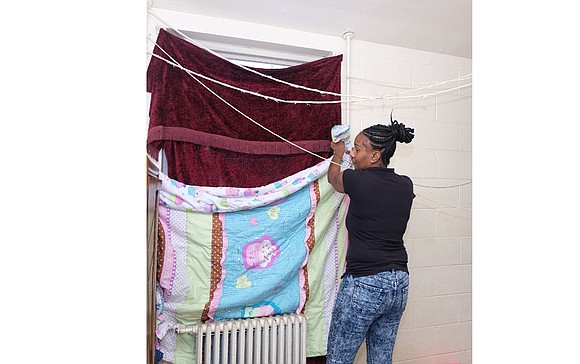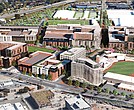More left in the cold
Hillside Court residents are plagued by same problem facing Creighton Court — no heat
Jeremy M. Lazarus | 1/13/2018, 9:45 a.m.

Kanya N. Nash thinks its fine that some Creighton Court residents have had a chance to stay at a hotel free of charge because the heat failed in their public housing units.
The 38-year-old mother of three just wishes that the Richmond Redevelopment and Housing Authority would show the same level of concern for her and her neighbors in Hillside Court who are facing the same conditions.
“I moved here in 2010 and I haven’t had working heat. I have called and called maintenance, but nothing has changed,” Ms. Nash said.
RRHA never provided her with a space heater; she had to buy her own. And to keep warm, she hangs blankets over the windows and uses them to seal the cracks in the sills and in her mailbox.
She knows it’s a lease violation. But Ms. Nash, who lives on a government disability check, has had to wrap herself in blankets and keep the oven running just to keep the chill off.
Just after Christmas, as the worst cold in decades gripped the area, Ms. Nash kept warm by staying with relatives and having her children stay with their grandmother.
“I’ve lived in public housing in New Jersey, too, and it is nothing like this. RRHA charges you if maintenance comes to look at a problem that a landlord is supposed to take care of. It can add $20, $30 to your rent each time. That never happened in New Jersey,” she said.
Ebony Turner has encountered the same problem. She thought she had secured low rent and safe and decent housing when she and her three children moved into a Hillside Court apartment in October after she lost her job.
But the heat never came on, Ms. Turner said. And when she complained to maintenance, she got space heaters. When she tried to run two, they blew the fuses. So she can only use one at a time.
“It’s not just heat,” Ms. Turner said. “I can’t get RRHA to fix my door. It’s been broken, and now the lock doesn’t work. You call in a report and you never hear back.”
Omari Al-Qadiffi of Leaders of the New South said the women are among a legion of residents in various public housing complexes who lack heat.
He compiled a list of 25 residents from Gilpin, Mosby and Whitcomb and other public housing communities who lack heat.
The spotlight has been on Creighton Court, where RRHA turned off furnaces in 12 buildings serving at least 49 families after finding water pipes connecting radiators to boilers were falling apart on the second floor, leaking water into ceilings and creating a threat of their collapse.
The issues bring public attention to the deteriorating condition of Richmond’s public housing and the management failures of RRHA.
The housing authority is the last great bastion in the Richmond area for “safe, decent and affordable” housing for families with average incomes below $15,000 a year. With 4,000 units, RRHA is the largest public housing operator in the state and one of the largest on the East Coast.
The perception that RRHA is an uncaring landlord can be found in the resident tales of the lack of response to the recent heating crisis. That image was amplified by a Jan. 3 Facebook post containing a photo of RRHA’s chief executive officer, T.K. Somanath, attending a family reception at President Trump’s Mar-a-Lago resort in Palm Beach, Fla., while Richmond public housing residents coped with bone-chilling cold in their apartments.
Mr. Somanath, who took over nearly three years ago promising to do more for the city’s have-nots, has been telling everyone who will listen that the blame belongs to Congress and the U.S. Department of Housing and Urban Development. He said money to maintain the city’s public housing has shrunk dramatically.
While more than $100 million is needed, the 72-year-old CEO has pointed out that RRHA is receiving only $750 per unit for maintenance, or about $3 million a year. He has said that the pipes in most buildings are 40 to 50 years old and past their useful life, requiring replacement.
But even years ago, when RRHA was receiving $6 million or more a year in maintenance funds from HUD, there was no serious program of preventative maintenance in place, such as a schedule for replacing aging wiring or plumbing and heating pipes.
Nor is there any sign of innovative solutions, such as hooking gas lines into relatively inexpensive gas-fired space heaters to replace the radiator systems.
And while RRHA has talked about replacing its public housing with modern developments, the agency has not rushed such progress. Even now, the only development underway is in the Creighton Court area. Proposals to redo Gilpin and Whitcomb are still just pipe dreams.
In fact, RRHA, an independent political subdivision whose only tie to the city is City Council’s appointment of its board members, has always maintained that it had the maintenance of its apartments under control.
Neither Mr. Somanath nor his predecessors have ever brought the problem to City Council or requested that the city invest a big chunk of its Community Development Block Grant funds into upgrading public housing units.
Meanwhile, evidence is mounting that Mr. Somanath and his upper level staff paid little attention to maintenance needs until the heating crisis emerged.
While Mr. Somanath has yet to respond to the Free Press, he acknowledged this week that RRHA staff knew about growing problems with radiator pipes in Creighton Court a year ago, but never communicated the problem to him or deputies in charge of housing.
His style has been to push responsibility for such work to lower level management — in this case, the maintenance staff, who appear to have been empowered to make decisions about repairs without any consultation with RRHA administration.
Or he may have continued a practice that had been in place before he arrived at the RRHA.
In any case, Mr. Somanath indicated that no repairs were made in the initial four buildings between spring and fall. In October, when the heat started being turned on, the maintenance department sought guidance as leaking radiator pipes were found on the second floor of more buildings.
Even then, there was no rush to make repairs, according to Carol Jones-Gilbert, chief operating officer for RRHA, who has stood in for Mr. Somanath during the past two weeks as he visited family in Florida for the holidays.
During a City Council session Monday, she was asked why nothing was done when RRHA learned about the problem in October.
Ms. Jones-Gilbert told the Free Press that RRHA staff consulted with the Richmond field office of HUD, which actually owns the public housing properties, and was told there were two options to deal with the crisis: Go out and hire a company to make repairs under a sole source contract or “abate the problem.”
RRHA chose to abate the problem by distributing space heaters to Creighton Court residents whose radiators were shut off because of the leaks, she said.
When temperatures dove into the single-digits after Christmas and were forecast to get worse, RRHA finally took action and issued a request for proposals for repairs.
But instead of labeling the situation an emergency, RRHA continued to slow-walk the problem; bids are due by Friday, Jan. 12.
Ms. Jones-Gilbert said only one company initially responded, but RRHA has since heard from three others.
That contrasts with the action taken in Mosby Court after a pump failure cut off heat to 16 units last week. Ms. Jones-Gilbert told the council that RRHA acted quickly to hire a company to make repairs to restore heat there.
Facing increasing fire over Creighton Court’s heating problems, including harsh criticism from Congressman A. Donald McEachin, RRHA staff began going door to door to talk with the 49 affected families.
Some families were moved to other units where heat was working. Seven families took up an offer from a hotel owner, who offered 20 free rooms to affected RRHA residents through Jan. 12.
Worried about their belongings or transportation back and forth, most residents stayed put, although Richmond Public Schools later offered its buses to transport people to and from Creighton Court.
Despite new urgency regarding residents in Creighton and Mosby, RRHA continued to show little interest in people in other complexes facing the same problem. There is no evidence that anyone from RRHA got in contact with Ms. Nash or Ms. Turner or anyone else complaining about lack of heat.
Mr. Somanath is promising to change practices to ensure maintenance staff regularly report problems up the chain of command. But there is no indication yet that RRHA plans to step up its efforts to make needed basic repairs or will end its practice of charging residents seeking repairs.
City Council members are up in arms about the situation, notably because Mr. Somanath came to them in mid-December to secure $4.9 million for a development project near Creighton Court, but did not mention the need for heating repairs.
Several council members, upset that they have little authority and cannot force RRHA to act, are now discussing the need for a full fiscal audit to find out how RRHA has been spending its money.
But that is no help to Ms. Turner and Ms. Nash, who keep hoping against hope that RRHA will show some concern for them and the other people they know in Hillside Court who have been left in the cold.
‘We have to hold our officials accountable’
By Ronald E. Carrington
More than 70 people from across the area demonstrated Monday night against what organizers termed the mistreatment and neglect of the more than 10,000 people living in public housing units managed by the Richmond Redevelopment and Housing Authority.
Standing outside of the RRHA headquarters on Chamberlayne Parkway in the cold and rain, Redemption Rally attendees from Creighton Court to Short Pump were moved as speakers talked about decades of poor management that have led to poor living conditions in RRHA housing.
They called for working heat during the winter and air conditioning in the summer, installation of more street lights and effective policing to improve neighborhood safety and reduce ongoing violence.
“We believe there is some mental anguish associated with these issues,” said James E. “J.J.” Minor III, president of the Richmond Branch NAACP and an advocate for the Richmond Tenants Association. “We are looking into this matter and investigating what has been going on.”
The RRHA manages nearly 4,000 units of public housing throughout the city.
During the recent severe cold snap, several residents of the Creighton Court public housing complex were moved to alternative housing because several units didn’t have working heating systems and space heaters provided by RRHA officials weren’t enough to stave off the cold.
Maurice Tyler, founder of Coaches Against Violence Everywhere, which organized the rally, said the problems in public housing are wider, deeper and more consistent than the latest episode.
“This situation is bigger than one group or one person,” Mr. Tyler told the rally participants. ”This is a whole City of Richmond issue, no matter your race, nationality or how much money you make. In subsidized housing, the tenants and the management company have a 50-50 responsibility and partnership. And as long as the problems have existed, the people and management should have been talking about them.”
Omari Al-Qadiffi, founder of Leaders of the New South, said his advocacy group addresses the three top expenditures of a household — housing, transportation and food access.
“When there are policies that impede those three areas, we fight those policies and recommend, support and implement new policies that help people,” he said. “Our effort is not focused on the RRHA CEO who was vacationing in Mar-a-Lago while residents were freezing in Richmond without heat.”
Mr. Al-Qadiffi thanked people from Richmond and the surrounding counties for providing needed resources to the housing community residents and donating hot meals, coats, hats, scarves and blankets to people as the housing authority stood by and did nothing.
“We have to make sure that the residents are voters,” Lynetta B. Thompson, a member of Community Unity in Action and past president of the Richmond Branch NAACP, told the assembled.
“To change the system, there has to be leadership from the bottom up and not the top down,” she said. “We have to hold our officials accountable. We have the power when we pool our efforts.”







